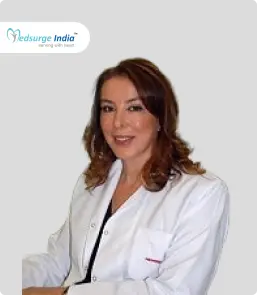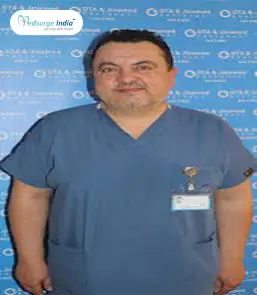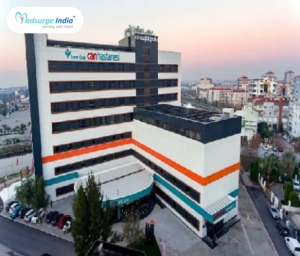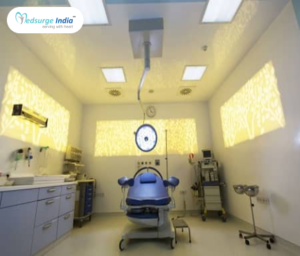IVF Treatment Cost in Turkey
Unlock Exclusive Discount : Your Gateway to Premium Healthcare with Medsurge India Health Value Card.

Unlock Exclusive Discount : Your Gateway to Premium Healthcare with Medsurge India Health Value Card.


Infertility is a common issue faced by many people globally, impacting both men and women. In vitro fertilization (IVF) is the most widely used reproductive procedure designed to help couples who struggle to conceive naturally after several attempts.
This process involves various medical treatments and some invasive techniques, all aimed at achieving a successful pregnancy. Recent advancements in reproductive medicine have also allowed IVF to be used for genetic testing and to help prevent certain birth defects.
While IVF treatment in Turkey is considered safe and has gained popularity, its success relies on various medical and personal factors.
Some patients may require multiple IVF cycles to achieve pregnancy. Other assisted reproductive techniques, like ICSI, genetic testing, and the use of donor eggs, can also be combined with IVF.
IVF treatment cost in Turkey are quite reasonable. The country is known for providing high-quality medical care at affordable prices. Patients can access top-notch facilities with competitive healthcare packages, advanced medical equipment, and skilled healthcare professionals when seeking IVF treatment in Turkey.
IVF treatment cost in Turkey start from 4,000 USD and can go up to 9,000 USD. While the average cost of IVF treatment for a single cycle cost around $2,500. The treatment is conducted on an outpatient basis, with men generally required to remain in India for a minimum of 7 days, while women typically stay for at least 45 days.
There will be variable reasons that can affect IVF treatment cost in Turkey, here we have listed some of the important key factors you should know about:
In vitro fertilization (IVF) is a sophisticated set of treatments used to aid in the creation of a child help with fertility or prevent genetic defects.
In IVF, mature eggs are extracted (retrieved) from the ovaries and fertilized in a laboratory with sperm. The fertilized egg (embryo) or eggs (embryos) are then transported to a uterus for further development. IVF takes roughly three weeks to complete. When these processes are broken down into smaller chunks, the procedure can take longer.
The most efficient form of assisted reproduction technology is IVF Treatment in Turkey. A couple’s own eggs and sperm can be used in the operation. Eggs, sperm, or embryos from a known or anonymous donor may be used in IVF. A gestational carrier, or someone who has an embryo implanted in their uterus, may be employed in some instances.
An individual might be an ideal candidate if they or their partner experience any of the following conditions:
When sperm concentration is below normal, motility is poor, or there are irregularities in sperm morphology, these issues can hinder the sperm’s ability to fertilize an egg.
This refers to a situation where no identifiable cause for infertility has been determined after a thorough evaluation.
If one partner has a potential genetic disorder that could be passed on to a child, IVF may be a suitable option, as embryos can be screened, allowing only those without known issues to be implanted.
Damage or obstruction in the Fallopian tubes can impede the fertilization of an egg or the transport of an embryo to the uterus.
If a woman experiences infrequent or absent ovulation, it results in a limited number of eggs available for fertilization.
This condition occurs when uterine tissue grows outside the uterus, affecting the uterus, ovaries, and Fallopian tubes.
These benign tumors, commonly found in women in their 30s and 40s, can obstruct the implantation of a fertilized egg.
For those about to undergo treatments like radiation or chemotherapy that may impact fertility, this option is beneficial. Women can have their eggs harvested and frozen for future use.
Prior to commencing the treatment, you and your partner will have a consultation with your doctor for several key reasons:
Initially, the doctor will:
Additionally, it is important to address critical questions with your doctor, such as the number of embryos to be transferred, management of multiple pregnancies, and any possible complications.
By the conclusion of the consultation, your doctor will determine if you and your partner are suitable candidates for In Vitro Fertilization treatment and will provide detailed instructions to follow before the procedure begins.
Patients undertake several screening procedures and medical examinations before beginning an IVF cycle to analyze the eggs and sperm of the female and male partners.
The following are some of the tests performed during the pre-treatment phase:
The following are the basic steps in an IVF procedure:
There are primarily two IVF protocols: When choosing the optimal treatment protocol and drug dose for patients who will get in vitro fertilization therapy, factors such as the woman’s age, ovarian reserve, blood hormone levels, and body mass index are taken into account.
The patients’ blood hormone levels will be tested, and vaginal ultrasonography will be used to keep an eye on the follicles. Human chorionic gonadotropin is given to the eggs when they reach the proper size, and they are picked up later that day or the next.
The fertility medicines used in the IVF process can cause some side effects and complications. The following are some of the probable side effects of such medications:
The following are some of the potential risks of IVF:
Some doctors may also practice embryo transfer. During this mock embryo transfer, the doctor will evaluate the depth of the uterine cavity and identify the best approach for transferring embryos into the uterus. To get a video consultation for IVF treatment in Turkey, do visit our website Medsurge India.
Every year, a large number of people travel to Turkey for IVF treatment or other forms of assisted reproductive technology. Patients benefit from affordable packages and great success rates at internationally approved hospitals and reproductive clinics with highly qualified IVF doctors.
There are multiple best IVF hospitals in Turkey, which serve both domestic and international patients and are located in various cities. Here are a few considerations to consider while choosing a hospital or clinic:
Selecting an international medical center that offers unique services to international patients may make the overall journey more comfortable for a medical traveler.
From visa processing to travel preparations to appointment scheduling and lodging, the foreign patient department at the finest IVF hospitals in Turkey assists and coordinates with the patient throughout the process.
Choosing the appropriate agency is essential for a smooth and successful medical travel experience. Medsurge India stands out as a leading medical tourism agency in India. We offer a wide range of services for international patients looking for cost-effective yet high-quality medical treatments. With our personalized service and strong collaborations with premier hospitals throughout India, we have established a remarkable reputation as a reliable healthcare facilitator.
In vitro fertilization (IVF) is a set of complicated operations including the fertilization of eggs and sperm in a laboratory, followed by embryo implantation and possibly pregnancy.
The eggs produced by the ovaries are harvested using special needles in a simple surgery and then mixed with sperm from the male partner in a petri dish for fertilization.
The embryo(s) is/are transplanted into the uterus of the woman, where it can grow and implant effectively during the pregnancy.
A 'test-tube baby' was the name given to a child created through IVF. This process normally requires more than one egg to be collected, and it is done under anesthesia with the help of an ultrasound guidance device.
The success rate of IVF treatment is determined by the couple's fertility and health-related features. Ovarian reserve, age, serious male sperm factor, and overall health of the women are all factors that influence IVF success rates. In IVF, couples have the option of using donor eggs or sperm.
Surrogacy is also a possibility for women who are unable to carry a pregnancy owing to health issues or other considerations. To boost the chances of conception, artificial insemination or intracytoplasmic sperm injection (ICSI) procedures might be used.
Patients undertake several screening procedures and medical examinations before beginning an IVF cycle to analyze the eggs and sperm of the female and male partners.
The following are some of the tests performed during the pre-treatment phase:
The following are the basic steps in an IVF procedure:
There are primarily two IVF protocols: When choosing the optimal treatment protocol and drug dose for patients who will get in vitro fertilization therapy, factors such as the woman's age, ovarian reserve, blood hormone levels, and body mass index are taken into account.
The patients' blood hormone levels will be tested, and vaginal ultrasonography will be used to keep an eye on the follicles. Human chorionic gonadotropin is given to the eggs when they reach the proper size, and they are picked up later that day or the next.
The fertility medicines used in the IVF process can cause some side effects and complications. The following are some of the probable side effects of such medications:
The following are some of the potential risks of IVF:
Some doctors may also do a practice embryo transfer. During this mock embryo transfer, the doctor will evaluate the depth of the uterine cavity and identify the best approach for transferring embryos into the uterus. To get a video consultation for IVF treatment in Turkey, do visit our website Medsurge India.
Turkish hospitals that perform IVF are well-known for their hospitality and patient care services providing the finest hospital and gynecologists in Turkey. However, choosing a suitable hospital for treating IVF in Turkey can be difficult for an international patient. It is a significant decision that must be made with several factors in mind, including:
Medsurge India is a prestigious support system for patients looking for doctors, hospitals, and specialized treatments. Our staff will provide you with a list of licensed, renowned, and trustworthy physicians and medical facilities in relation to your medical needs. Additionally, we offer a treatment strategy that fits your budget. Apart, we assist patients with obtaining travel authorizations, medical visas, and a multitude of other things.
A: Turkey has a considerably greater success rate in IVF therapy than any other country in the globe, and its inexpensive costs make it an appealing destination for foreigners, according to the professor. "Prices range from country to country and clinic to clinic.
A: One cycle of IVF treatment will take roughly four to six weeks to finish in hospitals in Istanbul and Antalya, Ankara, Turkey. Patients will have to wait for their eggs to mature before they can be implanted.
A: In comparison to several European countries, Turkish law is fairly rigorous in terms of who can be treated and what treatments are permitted. Surrogacy, as well as egg, sperm, and embryo donation therapies, are severely illegal in Turkey. It is against the law to treat lesbian couples and single women.
A: Most women have 20-35% success rates per cycle, but the chances of becoming pregnant diminish with each subsequent round, while the expense rises. Three full cycles of IVF improve the chances of a successful pregnancy to 45-53%.
A: Pregnancy following in vitro fertilization (IVF) is a special type of joy, but it can also increase the chance of certain difficulties. IVF raises the possibility of twins, triplets, or high-order multiples, as well as premature birth, high blood pressure, placental anomalies, and other complications.

IVF Specialist
Gynaecologist and Obstetrician
48+ Years of Experience
Gurgan Clinic, Ankara
View Doctor
IVF Specialist
Professor
23 years of experience
Medicana International Istanbul
View Doctor
IVF Specialist
Visiting Consultant
29 years of experience
Memorial Hospitals Group, İstanbul
View Doctor
IVF Specialist
Consultant
23 years of experience
Florence Nightingale Hospital, İstanbul
View Doctor
Gynaecologist and Obstetrician, IVF Specialist
Consultant
20+ years
Medical Park Hospital, Adana
View Doctor
IVF Specialist
Consultant
16 years of experience
Medical Park Group, İstanbul
View Doctor
IVF Specialist
Consultant
13 years of experience
Medical Park Group, İstanbul
View Doctor









By using our site, you agree to our Terms and Conditions, Privacy Policy and Refund Policy. Medsurge India provides reliable healthcare information and treatment options to support informed decision-making. Our content is designed to support and complement the guidance of your treating doctor, helping you feel informed and confident throughout your healthcare journey. We also Accept International Payments.

Copyright © 2025 NSM ONLINE SOLUTIONS PRIVATE LIMITED. All rights reserved.